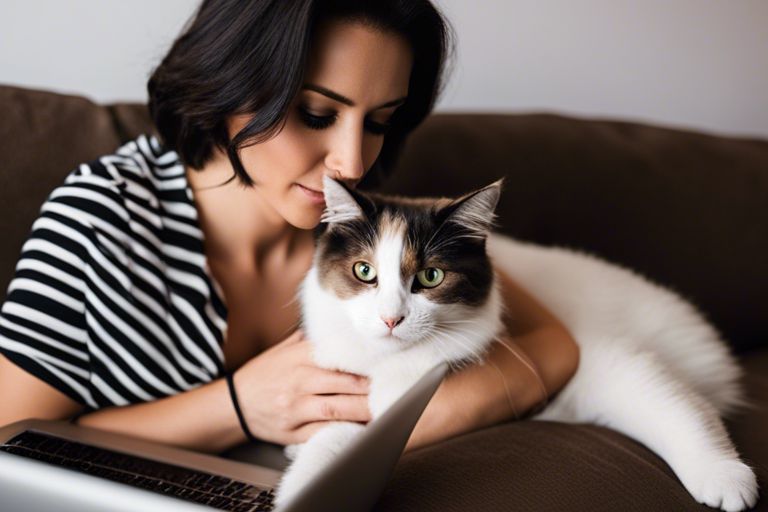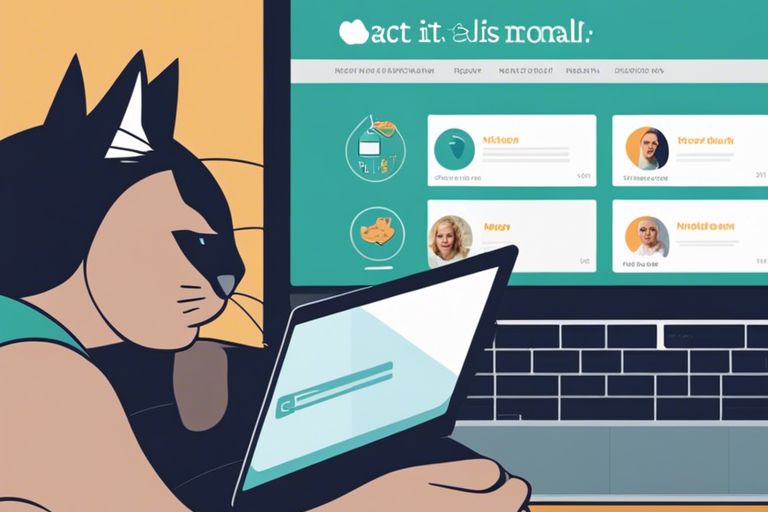Experiencing concern over your cat’s swollen abdomen is understandable, but it’s important to know that this isn’t always cause for alarm. Cats can develop a swollen abdomen for a variety of reasons, some of which may be serious while others may be relatively harmless. It’s essential to pay close attention to your cat’s overall health and behavior, as well as seek professional veterinary advice to determine the cause of the swelling.
Key Takeaways:
- Swollen abdomen in cats can be a sign of serious health issues. If you notice your cat’s abdomen is swollen, it’s important to seek veterinary care as soon as possible.
- Common causes of a swollen abdomen in cats include fluid buildup, tumors, or pregnancy. Your vet can perform diagnostic tests to determine the cause of the swelling.
- Other symptoms to watch for include lethargy, loss of appetite, and difficulty breathing. These signs can indicate a more urgent need for medical attention.
- Proper diagnosis and treatment are crucial for a positive outcome. Ignoring a swollen abdomen in your cat can lead to serious medical repercussions, so it’s important to address the issue promptly.
- Preventive care and regular veterinary check-ups can help catch issues early. Keeping up with your cat’s health and addressing any concerns with your vet can help prevent serious health problems from developing.
Recognizing a Swollen Abdomen in Cats
Any sudden changes in your cat’s appearance or behavior can be cause for concern. Recognizing a swollen abdomen in your cat is an important step in assessing their health. It’s important to understand what a normal cat’s abdomen looks and feels like in order to recognize potential issues.
Normal vs. Abnormal Abdominal Swelling
It’s normal for your cat’s abdomen to have a slight roundness to it, especially after a big meal. However, if you notice excessive swelling that is disproportionate to their body size, this could be a sign of a serious problem. Abnormal abdominal swelling may also be accompanied by discomfort or pain when touched. Any sudden changes in their abdomen should be carefully monitored and discussed with your veterinarian.
Signs and Symptoms to Monitor
When monitoring your cat for signs of abdominal swelling, keep an eye out for other symptoms that may accompany it. This can include loss of appetite, lethargy, vomiting, and changes in litter box habits, such as straining to urinate or defecate. If you notice any of these symptoms along with abdominal swelling, it’s important to seek veterinary care as soon as possible.

Common Causes of Abdominal Swelling in Cats
The causes of your cat’s swollen abdomen can vary widely, and it’s important to understand the potential reasons behind this concerning symptom. The following are common factors that may be contributing to your cat’s abdominal swelling. For a more comprehensive list, you may also want to read Possible Reasons Why Your Cat Has a Swollen Abdomen …
Gastrointestinal Issues
If your cat is experiencing a swollen abdomen, it may be due to gastrointestinal issues such as constipation, gas, or bloating. These issues can result in discomfort for your cat and may lead to the accumulation of gas or feces within the digestive tract. If left untreated, this could potentially lead to more severe complications. You may notice that your cat is straining to defecate or experiencing changes in their bowel habits. It’s important to address these symptoms promptly to ensure your cat’s well-being.
Fluid Accumulation (Ascites)
Fluid accumulation in the abdomen, known as ascites, can lead to significant swelling and discomfort for your cat. This condition may be indicative of an underlying health concern, such as liver disease, heart failure, or kidney malfunction. If you notice that your cat’s abdomen appears distended and firm to the touch, it’s crucial to seek veterinary care immediately. Ascites can be a sign of a serious medical issue that requires prompt attention and treatment.
Internal Parasites
Your cat’s swollen abdomen may be the result of internal parasites, such as roundworms, tapeworms, or hookworms. These parasites can cause intestinal inflammation and lead to bloating and discomfort for your cat. In some cases, you may even notice visible signs of worms in your cat’s feces. Prompt deworming treatment is essential to address this issue and prevent potential complications. Your veterinarian can provide guidance on effective deworming protocols for your cat.
Organ Enlargement or Tumors
Organ enlargement or the presence of tumors within your cat’s abdomen can lead to significant swelling and discomfort. Conditions such as feline lymphoma, liver cancer, or splenic tumors can contribute to abdominal distension. If you observe rapid or abnormal changes in your cat’s abdominal size, it’s important to have them evaluated by a veterinarian. Early detection and intervention are crucial in addressing potential cancerous growths and providing the best possible outcome for your cat’s health.
Diagnosis and Treatment
Now that you have identified a swollen abdomen in your cat, it is important to understand the potential causes and available treatment options. It is essential to seek veterinary help as soon as possible to determine the underlying issue and provide appropriate care for your feline companion.
Veterinary Diagnostic Techniques
When you take your cat to the vet for a swollen abdomen, they will conduct a thorough physical examination to assess your cat’s overall health. Diagnostic tests such as blood work, urinalysis, and imaging studies like X-rays or ultrasounds may be recommended to identify the cause of the swelling. In some cases, your vet may also perform an abdominal tap to collect fluid for analysis. These diagnostic techniques will help the vet determine the underlying condition causing the abdominal swelling and develop an effective treatment plan.
Treatment Options and Prognosis
Once the cause of your cat’s swollen abdomen is diagnosed, your vet will discuss the treatment options with you. The appropriate treatment will depend on the underlying condition, which could range from infections, gastrointestinal issues, or more serious conditions such as tumors or organ diseases. It is crucial to follow your vet’s recommendations for treatment to ensure the best possible outcome for your cat. The prognosis for your cat will depend on the specific underlying cause, but early diagnosis and intervention can significantly improve the chances of a positive outcome. Remember, early detection and treatment can make a significant difference in your cat’s health and well-being.
By addressing the issue promptly and following your vet’s guidance, you can help your cat recover and enjoy a happy, healthy life.
Preventative Measures and When to Seek Help
Keep an eye on your cat’s weight and body condition. Obesity is a common cause of a swollen abdomen in cats. Ensure that your cat is eating a balanced diet and receiving regular exercise to maintain a healthy weight. If you notice any sudden changes in your cat’s eating habits, appetite, or energy levels, seek veterinary advice as soon as possible. Additionally, be cautious of the quality and quantity of food you are providing to your cat. Consult your veterinarian for guidance on a tailored diet plan suitable for your cat’s individual needs.
Routine Health Checks and Diet
Conduct routine health checks on your cat, including feeling for any abnormalities in the abdomen. Regularly monitor your cat’s weight and body condition to prevent obesity. Consult your veterinarian for guidance on a well-balanced diet appropriate for your cat’s age, size, and health needs. Ensure that your cat is not overeating or consuming food with inadequate nutritional value.
Importance of Timely Veterinary Care
If you notice any signs of a swollen abdomen in your cat, it is crucial to seek veterinary care promptly. A swollen abdomen can indicate serious underlying health issues, including fluid buildup, tumor growth, or organ dysfunction. Delaying veterinary attention can worsen the condition and put your cat’s health at risk. Contact your veterinarian immediately if you notice any abnormal changes in your cat’s physical appearance or behavior, such as a swollen abdomen, lack of appetite, or difficulty breathing.
Is it normal for my cat to have a swollen abdomen?
Upon reflecting on the issue of your cat having a swollen abdomen, it is crucial to understand that this is not a normal condition. A swollen abdomen in cats can be a sign of various underlying health issues such as fluid accumulation, tumors, or reproductive problems. It is important to seek veterinary attention as soon as possible to properly diagnose and treat the cause of the swelling. Ignoring this symptom could lead to serious health complications for your cat, so it is best to address it promptly with professional help. Do not hesitate to consult with a veterinarian in order to ensure the well-being of your pet.
FAQ
Q: Is it normal for my cat to have a swollen abdomen?
A: It is not normal for a cat to have a swollen abdomen. This could be a sign of a serious health issue and should be addressed by a veterinarian as soon as possible.
Q: What could cause a cat to have a swollen abdomen?
A: There are several potential causes for a cat to have a swollen abdomen, including but not limited to fluid accumulation, tumors, organ enlargement, or pregnancy. A thorough examination by a veterinarian is necessary to determine the cause.
Q: How can I help my cat if it has a swollen abdomen?
A: It is important to seek veterinary care immediately if you notice your cat has a swollen abdomen. Attempting to diagnose or treat the issue yourself could be harmful to your pet. Follow the vet’s recommendations for treatment and carry out any prescribed medications or aftercare instructions diligently.

Jayley, a devoted cat enthusiast, also writer for other cat blog as well. She aims to dedicated to providing comprehensive information, insights, and advice on everything you’d ever want to know about our whiskered companions.
